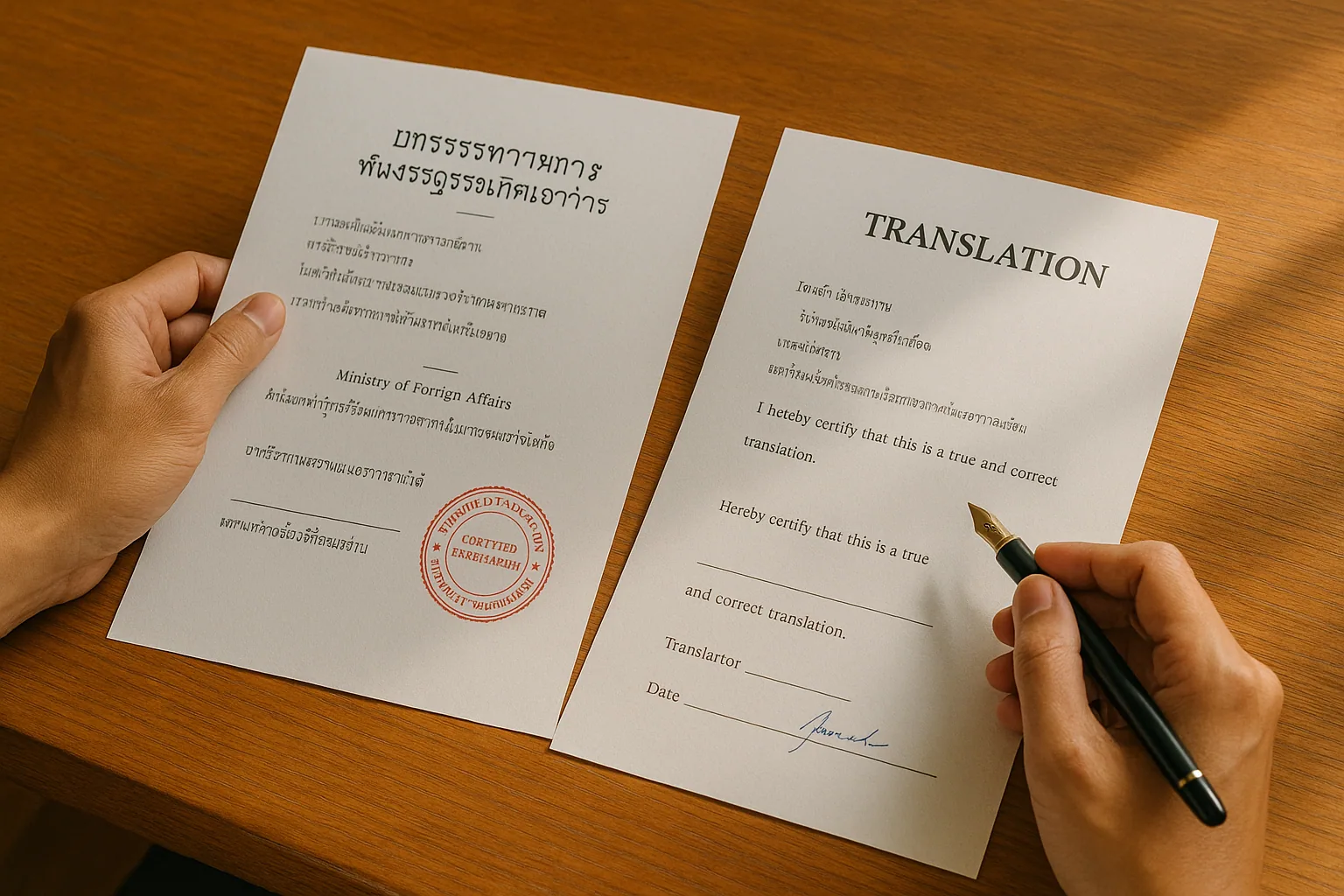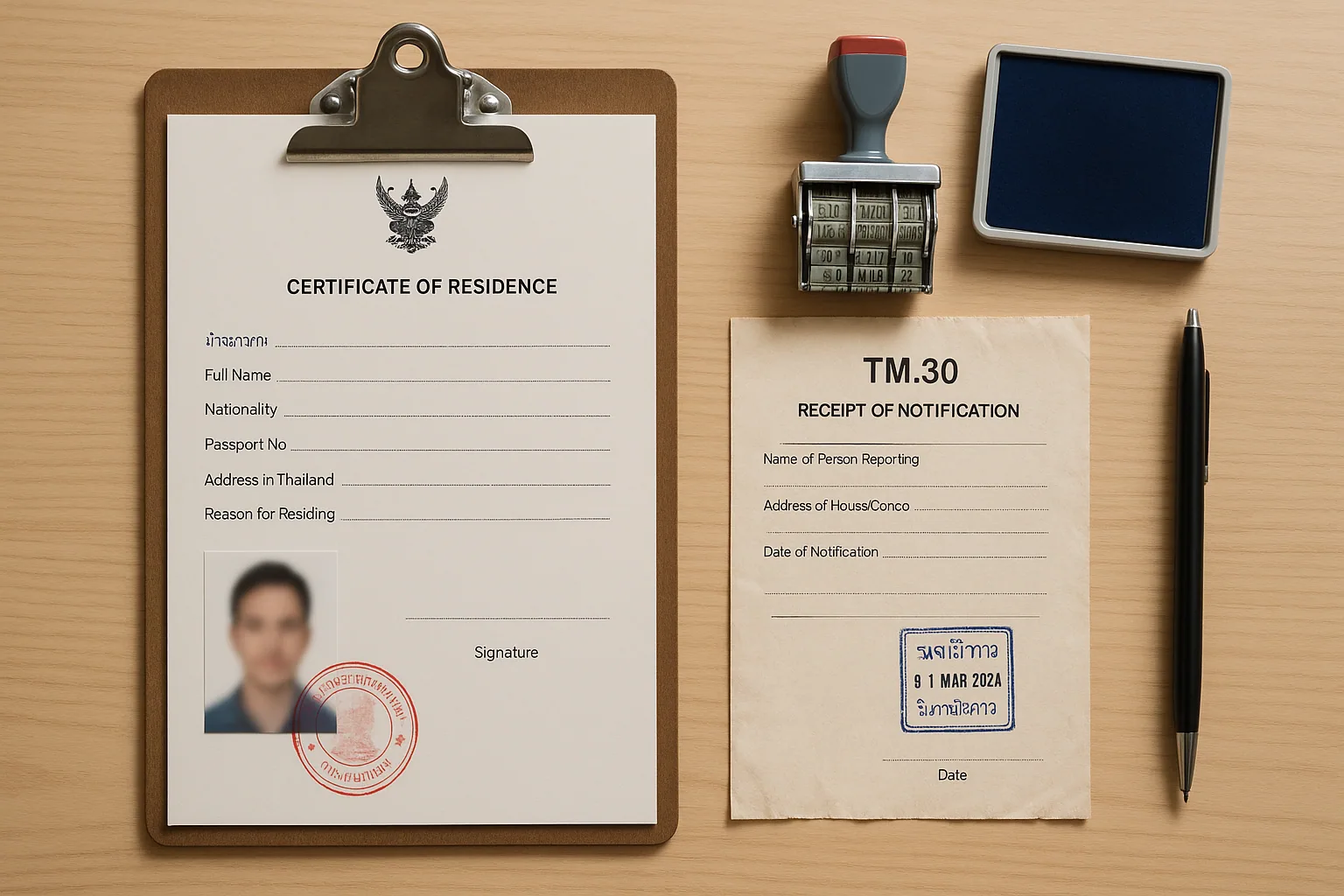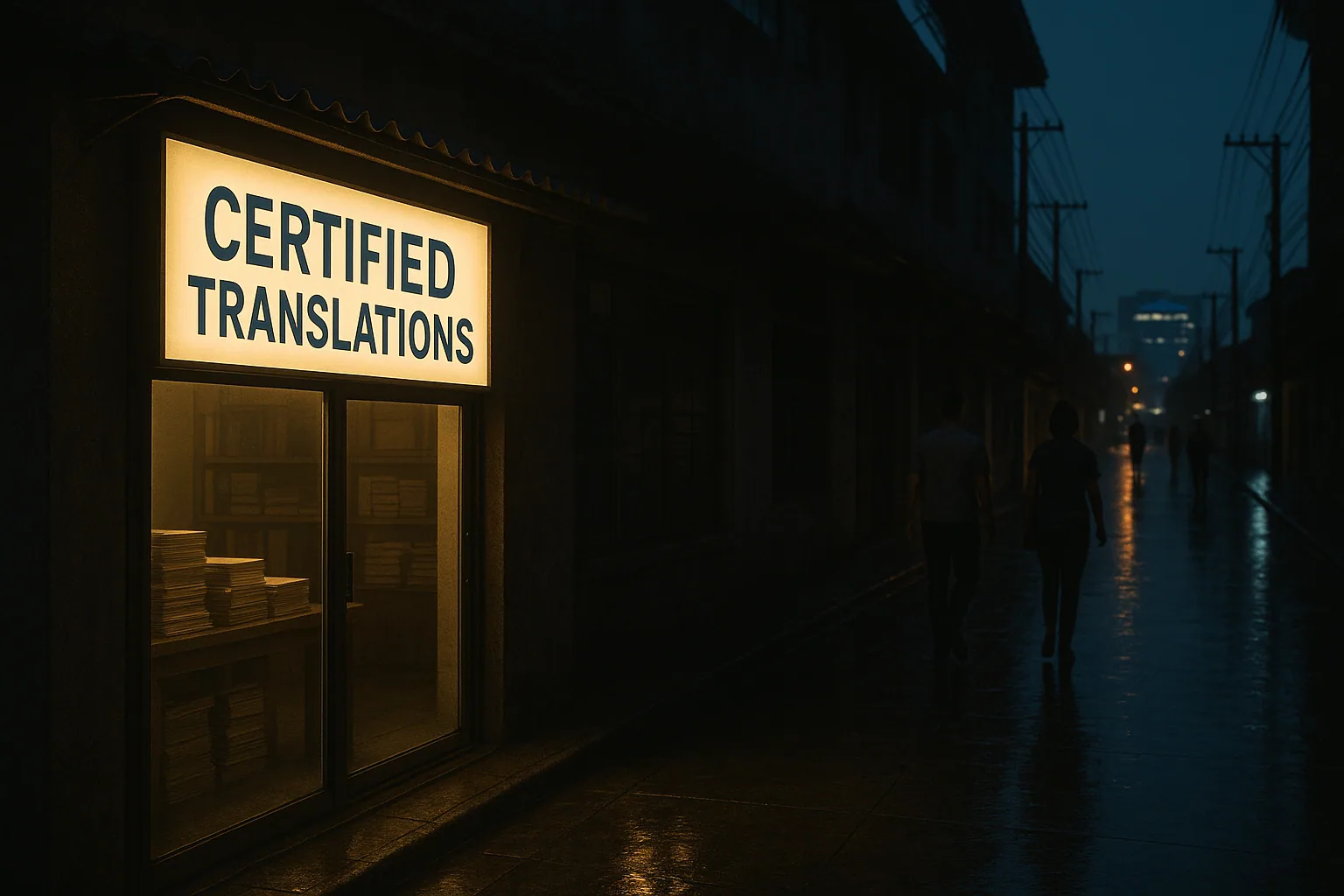
🗣️Translation Services
Finding certified translators for documents, visas, and legal matters

Finding certified translators for documents, visas, and legal matters
You're sitting in Immigration, and the officer slides your birth certificate back across the counter with a polite but firm head shake. "Need Thai translation," she says. "Certified." You nod, gather your papers, and step back into the Bangkok heat, now facing a task you've never done before in a system you don't fully understand. Where do you even find a certified translator? How much will it cost? How long will it take? And what exactly does "certified" mean in Thailand?
Document translation is one of those essential services that almost every expat in Thailand eventually needs. Visa applications, work permits, business registrations, property transactions, marriage certificates—Thai authorities want to see Thai text alongside your foreign documents. And not just any translation will do. For official purposes, translations generally must bear the translator's signed certification of accuracy, and (depending on where the document will be used) may also need MFA legalization and/or notarial/embassy authentication.
The good news is that Thailand's translation industry is well-developed, affordable by international standards, and concentrated in places where expats already need to go. The challenge is navigating a marketplace where quality varies wildly, where the guy offering "cheap fast translation" on Facebook might not produce documents Immigration will accept, and where understanding the difference between certified and uncertified translation can save you from redoing everything at twice the cost.
"Thailand has no single government-licensing system for sworn translators. Authorities usually accept documents that carry the translator's certification of accuracy, and—when required—MFA legalization or embassy/notarial authentication."
The distinction between regular translation and certified translation matters immensely in Thailand. A regular translator can convert text from one language to another—useful for understanding a contract or reading a letter. But Thai government agencies, Immigration, courts, and most official bodies require certified translation, which is a formal legal process.
Thailand does not have a single government-licensing system for "sworn translators." What authorities look for is (1) a translation with the translator's signed certification of accuracy and (2) the correct authentication path for where the document will be used—often MFA legalization and, in some cases, a Thai Notarial Services Attorney's notarization or embassy authentication. Professional associations (e.g., TIAT) exist, but membership isn't legally required for acceptance. When translators certify a document, they stamp each page with their official seal, sign it, and often include their business or professional registration details. This certification declares that the translation is accurate and complete to the best of their professional ability.
Immigration officers and government clerks can spot an uncertified translation instantly. No seal? No signature? They'll reject it without discussion. Expect to provide a translation with a signed certificate of accuracy (and typically a stamp/seal). Some offices also ask to see the translator's business or professional registration details, but there's no single national translator license number in Thailand. I've watched this happen to someone who had their entire university diploma translated by a bilingual friend—beautifully done, perfectly accurate, but completely unacceptable because it lacked that official stamp. They had to pay a certified translator to redo the entire thing, wasting both money and time.

Translation pricing in Thailand is refreshingly straightforward: almost everyone charges by the page, with rates varying based on document complexity, urgency, and language pair. The standard rate for certified Thai-English or English-Thai translation in 2025 runs 350-700 baht per page for simple documents like passport pages, ID cards, or brief letters.
More complex documents cost more. Standard civil documents like birth certificates, marriage certificates, divorce certificates, and bank letters typically run 500-900 baht per page. Legal contracts—where every word carries weight and mistranslation could have serious consequences—can reach 800-1,500+ baht per page. Academic transcripts, business contracts, medical records, and technical documents command premium rates because they require specialized translators with domain expertise.
Rush service costs extra, with surcharges varying by shop—commonly +30% or +50-200 baht per page for expedited service. Need your marriage certificate translated by tomorrow? Expect to pay a significant premium. Same-day service is often available in Bangkok, particularly near Chaeng Watthana Immigration office, though rush fees can be substantial. Standard turnaround for most documents is 1-3 business days, which works fine if you plan ahead but becomes expensive when you're rushing to meet a visa deadline you forgot about.
One money-saving tip: order extra certified copies when you first get something translated. Many translators charge only around 50 baht per page for additional certified copies of the same translation if done at the same time. This is dramatically cheaper than re-translating the entire document months later when you discover you need another copy for a different government office. I keep three certified copies of my birth certificate translation, my marriage certificate translation, and my degree translation—it's saved me considerable hassle and money.
Simple documents (350-700 baht per page): Passport pages, ID cards, brief letters
Standard documents (500-900 baht per page): Birth/marriage/divorce certificates, bank statements, employment letters
Complex documents (800-1,500+ baht per page): Academic transcripts, business contracts, medical records, technical manuals
Rush service: Shop-specific (typically +30% or +50-200 baht per page; same-day often available in Bangkok)
Extra certified copies: Often around 50 baht per page if ordered with the original job
The easiest place to find certified translators is near the places you'll use their services. The area around Chaeng Watthana Government Complex—where Immigration and many government offices are located—is thick with translation shops. Walk into any of the shophouses near the Chaeng Watthana Immigration office, and you'll find translators who have processed thousands of visa documents and know exactly what Immigration expects. They can often complete standard documents while you wait if you arrive early in the morning.
Embassy neighborhoods are another prime hunting ground. The Wireless Road area near the US Embassy, Sathorn where multiple European embassies cluster, and the streets around various consulates all have translation services that specialize in documents those specific embassies commonly require. These translators understand embassy-specific formatting requirements and can often advise whether your particular document needs additional steps like notarization or consular legalization through the MFA. Note: Thailand is not party to the Hague Apostille Convention as of November 2025; plan on consular legalization (MFA) rather than apostilles for use in Thailand.
Online services have matured significantly in recent years. Established companies like Sawadee Translations, Bangkok Translation Services, and Modus Language Services maintain websites where you can upload documents, get instant quotes, pay online, and receive certified translations by email or courier. This works brilliantly if you're not in Bangkok or if dragging yourself to Chaeng Watthana sounds unappealing. The catch is turnaround time—online services typically take 2-5 business days for standard documents, whereas physical shops might complete the same work in a few hours.
Law firms with expat clients often have in-house translators or long-standing relationships with certified translators they trust. If you're already working with a lawyer for property purchase, business registration, or visa matters, ask if they handle translation or can recommend someone. You'll pay slightly more than going directly to a translation shop, but the convenience of bundling everything with your lawyer's other services can be worth it.
→ Near Immigration: Chaeng Watthana Government Complex area—dozens of shops specializing in visa documents
→ Embassy districts: Translators near embassies understand specific formatting requirements for each country
→ Online services: Convenient for standard documents, longer turnaround but no need to travel
→ Law offices: Slightly more expensive but integrated with other legal services
→ University language departments: Some offer translation services, especially for academic documents

Certain documents come up again and again in expat life. Birth certificates top the list—you'll need them for visa extensions, work permits, marriage registration in Thailand, and adding dependents to your visa. Marriage and divorce certificates are similarly essential if you're applying for visas based on marriage to a Thai national or need to prove your marital status for various official purposes.
Educational documents—degrees, diplomas, academic transcripts—are required for teaching jobs, work permits in professional fields, and certain visa categories. The translation of these documents is particularly important because Immigration and the Ministry of Labor scrutinize them closely, checking that your qualifications match your stated profession. Any discrepancy between your original document and the translation will be caught and questioned.
Property-related documents need translation if you're buying or selling real estate, signing lease agreements that reference Thai legal codes, or dealing with condo juristic person matters. Bank statements are often required for visa applications to prove financial stability—Immigration wants to see that you have adequate funds, and they want to see it in Thai. Business owners need contracts, company registration documents, shareholder agreements, and financial statements translated for various regulatory compliance requirements.
One category that surprises many newcomers: medical records. If you have a serious health condition, undergo a medical procedure in Thailand, or need to transfer your medical history to a Thai hospital, having key documents translated makes everything smoother. Thai doctors can work with English records, but having certified Thai translations eliminates ambiguity and can be crucial for insurance claims and legal matters related to medical care.
The best way to avoid translation problems is understanding what the receiving party expects before you commission the work. If you're translating documents for Immigration, ask them directly or check their published requirements about formatting. Some offices want translations on specific paper sizes, some want each translated page attached to a copy of the original, some want everything bound together in a specific order.
Provide clean, clear copies or originals to your translator. Faded photocopies, documents with handwritten notes in the margins, or papers with coffee stains will either be rejected or cost extra because the translator has to work harder to decipher unclear text. If your original document has any ambiguity—smudged names, unclear dates, official stamps that don't photocopy well—address this before translation. It's far easier to get a fresh certified copy of your birth certificate from your home country than to fix translation problems caused by a poor-quality source document.
Confirm the translator will sign a certificate of accuracy and advise whether MFA legalization and/or notarial/embassy authentication is required for your specific filing. Ask about their experience with your type of document and the office where you'll submit it. Established translators, especially those near Immigration or embassy districts, will have processed hundreds or thousands of similar documents and know exactly what each office expects. If someone seems uncertain about basic requirements or can't show examples of their certified work, consider looking elsewhere.
Finally, keep your translated documents safe and accessible. Scan everything and store digital copies in cloud storage. Keep physical copies in a dedicated folder that doesn't move around. You'll be surprised how often you need to produce these documents again—for visa renewals, for rental applications, for bank accounts, for job changes. Having them immediately available saves repeated translation costs and eliminates the scramble when you're up against a deadline.
Translation services in Thailand operate in that space between straightforward and confusing—simple once you understand the system, but filled with small details that can derail things if you get them wrong. The certification matters. The quality of your source documents matters. The translator's experience with your specific type of document matters. But none of this is particularly difficult or expensive if you approach it systematically. Find a reputable translator, provide clean documents, explain what you need them for, and build a relationship with a translator you can return to repeatedly. Your future self, standing at an Immigration counter with perfectly translated documents, will be grateful you did.
CERTIFIED VS REGULAR
Certified Translation
Official stamp & signature
Required for government/legal use
Regular Translation
No official status
Personal use only
STANDARD COSTS (2025)
TURNAROUND TIME
Most Frequent
Birth/marriage certificates
Passport pages
Bank statements
Work-Related
Degrees & transcripts
Employment letters
Business contracts
Property
Lease agreements
Purchase contracts
Condo documents